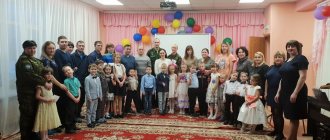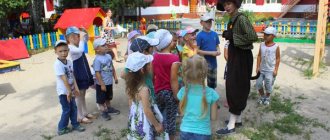Main directions of work with parents in the context of the implementation of the Federal State Educational Standard (FSES) Consultation on the topic
Consultation
“The main directions of work with parents in the conditions of implementation
Federal State Educational Standard "DO"
In conditions when the majority of families are concerned with solving problems of economic and sometimes physical survival, the tendency of many parents to withdraw themselves from solving issues of upbringing and personal development of the child has increased. Parents, not having sufficient knowledge of the age and intellectual characteristics of the child’s development, sometimes carry out education blindly. All this, of course, does not bring positive results. And we, teachers, know that everything comes from the family, the main educators of children are parents!
Family and kindergarten are two sources that shape our future generation. Everyone knows that a child’s personality is formed by the age of 7, in kindergarten. Often we, teachers, and the parents of our students do not always have enough mutual understanding, tact, patience, even time to hear and understand each other, and all this is reflected in the upbringing of our children. It's no secret that many parents are only interested in food or clean clothes. Many people think that kindergarten is a place where they only look after children while parents are at work. And we, teachers, often experience difficulties in communicating with parents for these reasons.
A preschool institution faces two main questions:
• How to interest parents in working together?
• How to make them participants in the educational process?
After all, a positive result can only be achieved within a single educational space, implying interaction and cooperation between preschool teachers and parents throughout preschool childhood.
Modern families, different in composition, cultural traditions and views on education, have different understandings of the child’s place in the life of society. However, they are all united in wanting the very best for their baby, but, unfortunately, not everyone is ready to respond to the various initiatives of the kindergarten. The task of the teaching staff is to interest parents and involve them in the creation of a unified cultural and educational space “kindergarten-family”.
The concept of modernization of Russian education (reflected in the Federal State Educational Standard for Education, Order No. 1155 of October 17, 2013) emphasizes the exclusive role of the family in solving the problems of raising the younger generation. Recognition of the priority of family education requires other forms of interaction between family and kindergarten.
The leading goal of interaction between a kindergarten and a family is to create the necessary conditions for the development of responsible and interdependent relationships with the families of pupils, ensuring the holistic development of the preschooler’s personality and increasing the competence of parents in the field of education.
The same forms of interaction with parents are not effective. Work with parents should have a differentiated approach, taking into account the social status and microclimate of the family, as well as parental requests and the degree of interest of parents in the activities of the preschool educational institution.
Both the teacher and the parent are adults who have their own psychological characteristics, age and individual characteristics, their own life experience and their own vision of problems. As long as an adult has enough knowledge for successful interaction, he has no doubts about this knowledge. There is a saying: “You can lead a horse to water, but you can’t make him drink” – and so it is with training. An adult learns based on pragmatic motives. New knowledge introduces a person to a different social reality: it gives a new vision of the problem and the world. The task of the teaching staff is to create conditions for fruitful cooperation with parents.
A lot for a child depends on the professional and human relationships of adults in the preschool educational institution: educators, specialists, parents - their relationship to themselves, to each other, to the child. All these adults are directly involved in creating a favorable climate for the child. The interests of the child may suffer if the relationship between kindergarten workers and parents does not work out.
Unfortunately, some teachers assume that it is they who must “explain” to parents how to raise their children, and choose an edifying tone: they do not advise or suggest, but demand; They do not suggest, but instruct. All this puts parents off. But the result is the same - the kindergarten and the parents are raising the child without interacting with each other. And the very forms of work with families do not give the desired results, since they are aimed at interacting with a wide range of parents, with the entire parent group of the group. Under these conditions, it is impossible to recognize the individuality of the family and the child, his problems and successes, to get closer and communicate, to activate and work together.
Analyzing the forms of work with parents, we can roughly formulate
4 main areas of work with parents in the context of the implementation of the Federal State Educational Standard for Education: educational, information-analytical, visual-information, leisure.
- Cognitive direction.
Goal: aimed at familiarizing parents with the age and psychological characteristics of preschool children, developing practical skills in raising children in parents.
This direction includes:
— general, group meetings;
— consultations and individual conversations;
— exhibitions of children's works and crafts made together with parents. By participating in the making of crafts, parents revealed interests and abilities that they themselves were not aware of.
- participation of parents in the preparation and conduct of holidays, entertainment, and leisure activities.
— joint excursions;
— open GCD. Open screenings give parents a lot: they get the opportunity to see their child in a situation different from the family situation, compare his behavior and skills with the behavior and skills of other children, and learn teaching and educational techniques from the teacher.
— joint creation of a subject-development environment;
— a helpline (all parents have the number of the head and teachers).
- morning greetings;
— Mail of trust;
- family projects.
- Information and analytical direction.
Goal: aimed at identifying the interests, needs, requests of parents, the level of their pedagogical literacy, establishing emotional contact between teachers, parents and children.
Helps to better navigate the pedagogical needs of each family and take into account individual characteristics.
In this direction you can carry out:
— questioning;
— testing.
From the analysis of information about children’s families, it is clear that preschoolers come from families of different social status and have different levels of education. This information was used when planning organizational and pedagogical work with parents to attract parents to assist the institution, to determine the prospects for the development of the kindergarten.
- Visual and information direction.
Purpose: makes it possible to convey to parents any information in an accessible form, to tactfully remind them of parental duties and responsibilities. Kindergarten begins with the locker room; it is very important that it is cozy and beautiful, so our parent corners are bright and attractive.
This direction includes:
— parent's corner: including various information.
Practical material is placed on the stand, making it clear what a child does in kindergarten, specific games, tips, tasks.
- regulations;
— announcements and advertisements; - productive activities of children (drawings, crafts);
- mobile folder.
The form of work through parent corners, regulatory documents, notices and advertisements, productive activities, moving folders is traditional, but it is necessary for working with parents, because often the teacher does not have the opportunity to come up and talk with parents on a current topic in raising children. New, beautifully designed information quickly attracts the attention of parents and gives a positive result.
— emotional corner: “Hello, I’m here.”
— photo exhibitions;
- publication of newspapers.
- Leisure direction:
Goal: designed to establish warm, trusting relationships, emotional contact between teachers and parents, between parents and children.
This direction is the most attractive, in demand, useful, but also the most difficult. This is explained by the fact that any joint event allows parents to see the problems of their child from the inside, compare him with other children, see difficulties in relationships, see how others do it, i.e. gain experience interacting not only with their child, but also with parent community in general. Holidays should be held not for parents, but with the involvement of parents, so that they know how much trouble and work must be put into preparing any celebration.
Meetings with parents at festive events always mobilize, make our everyday lives brighter, this increases our self-esteem as a teacher, parents gain satisfaction from working together and, accordingly, the authority of the kindergarten grows.
In this area you can organize:
- holidays that can end with tea. Mothers are mainly involved in raising children. They also mostly go to kindergarten.
- entertainment;
— acquaintance with the professions of parents;
— birthday celebrations;
- exhibition of family collection
- stock. Many people have books and toys that their children have “grown out of.” How many educational moments are hidden in this small event! This is a careful attitude towards old things, while children learn not only to accept gifts, but also to give them - this is a lot of work, education of the soul.
- days of good deeds.
The upbringing and development of a child is impossible without the participation of parents. In order for them to become teacher assistants and develop creatively together with children, it is necessary to convince them that they are capable of this, that there is no more exciting and noble thing than learning to understand your child, and having understood him, helping in everything, being patient and delicate and then everything will work out.
Interactions between parents and kindergarten rarely occur immediately. This is a long process, long painstaking work, requiring patient, unwavering pursuit of the chosen goal, and a constant search for new ways of cooperation with parents.
Literature:
- Internet resource - https://www.maam.ru/detskijsad/-osnovnye-napravlenija-raboty-s-roditeljami-v-uslovijah-realizaci-fgos-do.html
- 555 ideas for involving parents in kindergarten life. – M.: Sphere shopping center, 2011
- Innovative forms of interaction between preschool educational institutions and families: parent meetings and conferences, discussions, workshops, round table meetings/ed.-comp. N.M. Sertakova. – Volgograd: Teacher, 2015. -2013.


